How I became the first person to run a multistage, 250km ultramarathon on all seven continents
Brisbane’s Jacqui Bell overcame mental health and prescription drug issues to become the youngest person in the world to run a multistage, 250km ultramarathon on all seven continents.
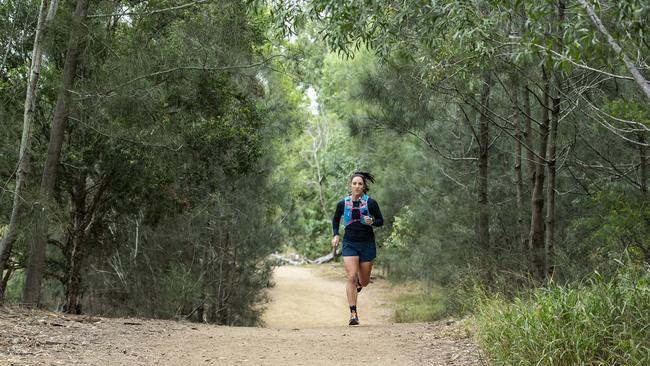
QWeekend
Don't miss out on the headlines from QWeekend. Followed categories will be added to My News.
One word gets a good workout when globetrotting ultramarathon runner Jacqui Bell talks about herself. Stubborn.
Listen to the 25-year-old’s tales of running through some of the harshest environments on the planet and time and again, it’s that trait that sees her rise to her throbbing, blistered, tortured feet and keep going.
Like that first big race on her way to becoming the youngest person in the world to run a multistage, 250km ultramarathon on all seven continents, the one through Africa’s Namib Desert. The one where her body was in so much agony, her mind so delirious, that she crawled into a ball at the penultimate checkpoint on day five and wailed so hard, so wretchedly, it startled other competitors. She had about 10km to go of an 80-plus km leg. She’d been going since 8am. It was around midnight. Everyone thought she’d pull out. She got up and staggered on.
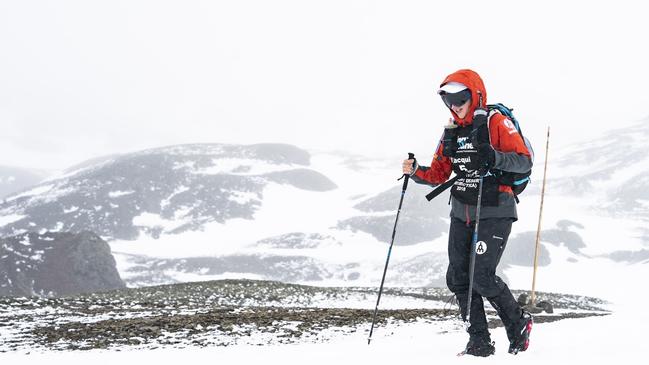
Or that time in Antarctica, early in an interminable loop of snow and ice, having barely slept on the boat that got her there because of seasickness, when she hit a soft spot in the ice sheet and plummeted into below-zero water. She flailed about for a minute or two before being pulled out, soaked. She could change, she was told. But that would strip half an hour from her time. She ran on, freezing. She had 10 hours to go.
It’s slightly disorienting hearing the raspy-voiced Bell tell these stories while sitting in the sumptuous comfort of her parents’ apartment where she lives in Tennyson, in Brisbane’s inner south. Each story of self-inflicted torture fills me with more questions, the abiding one, “Why?”. I’ve already asked if people think she’s mad. She’s not offended; they do.
The truth is, Bell says, she’s as mentally strong as she’s ever been. She has purpose, goals, a sense of achievement, a ticket to the world, drive, resilience. Stubbornness.
If others don’t get it, so be it. “I’ve almost stopped worrying about getting the validation of other people and trying to explain to them the way I live my life or the things I do,” she says. “By me living my life like this, I’m my best version, which means I show up to friends, family and work as my best self.”
She’s spending much more time with family and friends now since her wings were clipped by COVID-19. Plans have been ditched that would have seen her away from home, competing or giving motivational speeches, for the bulk of the year.
It’s not ideal, she says, but she can take a break without “falling in a heap”. She insists endurance running is not a new addiction. Addiction is something Jacqui Bell knows and, she says, it doesn’t feel like this.
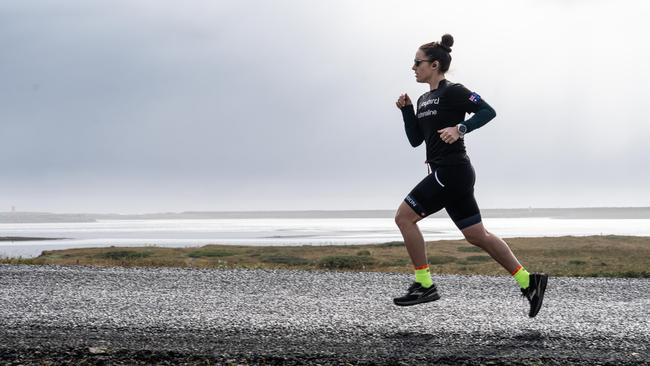
Bell was eating a chocolate bar and scrolling through Instagram when the weight of her lost years crashed over her. Everyone seemed to be doing so many interesting things. For a girl who’d been in a hurry to leave Ipswich Girls’ Grammar School and “get my life started”, she’d taken too many wrong turns and ended up 15kg overweight, unmotivated and rudderless. Washed up at 22.
“I just knew I had to make a massive change,” she says of that light bulb moment in mid-2017 when she set her sights on ultramarathons. “I looked back on the last few years of life and knew I couldn’t keep putting myself through this crazy rollercoaster lifestyle.”
She had certainly crammed a lot in. The one-time Australian school girls tennis player had harboured dreams of going on the circuit until the age of 16, when she realised she “didn’t love it enough”. With that shelved but a belief that sport was always going to be her calling, she left school midway through Year 11 and moved to the Sunshine Coast to study a Certificate IV in fitness.
On weekends, the then-17-year-old would party. The two don’t mix, she says, but “I was giving it a good crack”. “I lasted about eight months up there and the bank account was getting empty; I was all over the shop.”
Soon after graduating, Bell got a job at Daydream Island in the Whitsundays as a lifeguard and fitness activities attendant. Staff quarters have a reputation for being party places but Bell had another ambition – travelling overseas. She pulled back on the drinking and saved. Four months later, she was off to Rome as an au pair for six months. It was a cruisy job, she says, but the search for purpose remained.
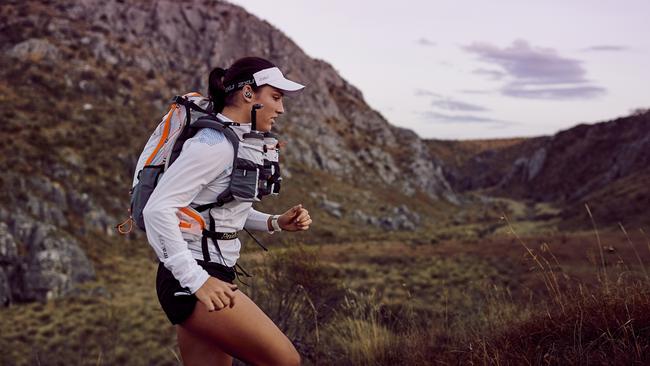
Back to Ipswich. “And that’s when the injuries began. And the painkillers.”
Within 10 months, she broke both wrists in separate incidents (the first in an AFL tackle against Tayla Harris, now a star Carlton forward and internet troll slayer), had a tonsillectomy, broke her foot playing tennis, then a finger in AFL and broke a toe kicking it in a bar.
She’d been prescribed Endone and OxyContin. She took them.
“Everyone’s different, I guess, but I’d get this massive euphoric high feeling and I just got hooked on it,” says Bell, who was now 21, living in St Lucia with flatmates and working as a personal trainer. She never doctor-shopped; just used the scripts she was given in the string of injuries. The highs led to lows. She went to a doctor, crying. She wanted a referral to a psychiatrist but was given antidepressants. She feels that doctor let her down.
Still searching, she decided to move to Bali to become a yoga instructor in mid-2016. No painkillers, no antidepressants. A new start. She finished the five-week course, got a job in a gym in a stunning health and fitness retreat. About 5pm on the last day of her first week at the retreat, she sent a selfie to her parents, Allan and Coleen, happy. “Off to dinner with friends,” she said.
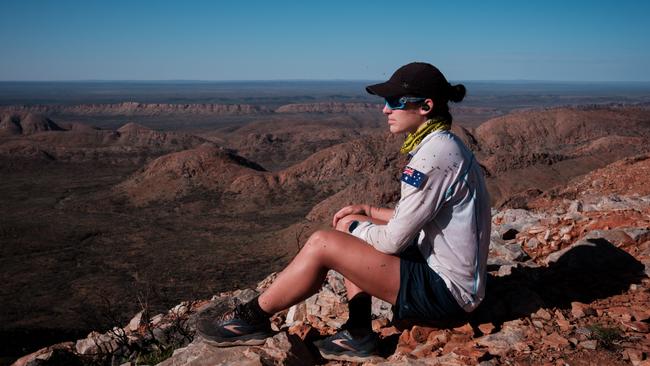
She woke up in a hospital bed; lacerations all over her body requiring six hours of surgery and more than 200 stitches, cracked teeth, face busted up, extensive ligament and tendon damage, dirt, blood and twigs in her hair, suspected bleeding on the brain. Muggers had ripped at her handbag that was draped over her shoulder as she rode her scooter to dinner, sending her flying. She describes her terror on waking up alone, disoriented and fearful that her organs would be harvested. She ripped out her drips and struggled out of bed, acting erratically.
Bell believes her failure to properly process the trauma of the accident led to her next spiral when, a few months after recuperating, she went to Melbourne to work in a gym. “I fell into the worst place; I was there for six months and it was horrible. Worst time of my life. Party drugs. MDMA, cocaine and then I was getting my hands on Adderall, Ritalin, all these pick-me-ups.”
It frightens her how easy they were to access. “Once you find yourself in that crowd, it’s not hard. You’ll meet up with someone and it’s like, ‘How’s your day, here, here’s a heap of drugs’. So casual. I was taking anything that would give me that high. But what goes up must come down, right?”
She was sacked. And went back home to her parents’ house.
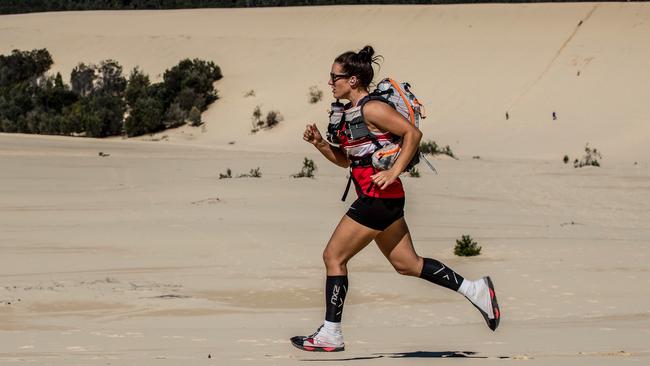
The realisation over a chocolate bar that she had to get her life together made her think deeply about what made her happy. The answer was running. She searched YouTube and found a video of an ultramarathon through the Simpson Desert. That competition wasn’t active when she delved further – but she found the 4 Deserts Ultramarathon Series.
What’s not to like? Take your pick of running 250km within a week through the hottest desert, the Namib in Namibia, or the windiest, the Gobi in Mongolia, or the driest, the Atacama in Chile, or the coldest, Antarctica.
Or, set your sights on being the youngest woman – 23 at the time – to do all four, all in the same year.
And so she jetted off to Africa in May 2018 and ran up and down the sand dunes of one of the most inhospitable deserts on earth. Then walked, then hobbled, then staggered. It was, she wrote in a blog, “like running uphill in the pit of a volcano with a warm hair dryer blowing on your face”. Her Achilles tendon and plantar fascia caused her agony, she lost eight toenails, her lips and feet blistered, her back was rubbed raw by her pack. But she finished. There was no feeling of elation as she crossed the line. “I was like, ‘That sucked, that was horrible’.”
So why not chalk it up as a monumental achievement and call it quits? “I’d already paid money and said I was gonna do all four so I was doing all four. And I knew I needed all four. I wasn’t going to miraculously have a breakthrough in my life by doing one race.”
She dug in. “I’ve been stubborn since I was 10 years old,” she says with a grin. “Well, my parents say since I was born.”
By the end of 2018, Bell had run across Mongolian steppes as young villagers skylarked on galloping horses; forded rivers in the canyons of the Atacama and given way to penguins in Antarctic blizzards.
But she wasn’t there yet. “I think I started to figure myself out a bit after probably the fifth or sixth race,” she says. No.5 was the Alps 2 Ocean Ultra in New Zealand’s South Island (classified as the Oceania continent); No.6, the Fire and Ice Ultramarathon in Iceland.
In September last year, she set off to conquer the US’s Grand to Grand Ultra, running from the rim of the Grand Canyon to the summit of the Grand Staircase and into the history books as the youngest person to take on and finish these gruelling events on all continents.
Each blister, each bout of tears, each growing sense of achievement brought her closer to knowing and liking herself more.
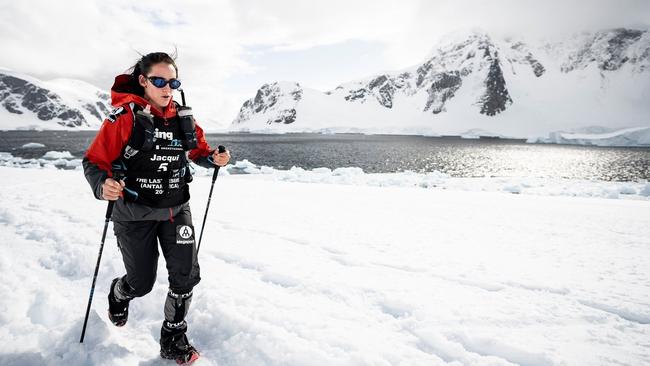
“As a young person, it’s so easy to get caught up in rushing around,” she says. “You don’t really get to learn about yourself; who you are, what you like, what you want.
“[In these races] you’ve got hours and hours to yourself. Anything that’s bothering you, any conundrum or inner demon, you’re forced to look at it and deal with it. Then,” she says with a laugh, “you’ll come back to ‘Oh, my feet hurt’.”
There’s an ease about Bell, a far cry from the anxious, mixed-up woman she describes from a few years ago. She’s confident, quick to laugh and has an impish quality about her. She tells of the first night at the Grand Canyon, where, as is typical in these races which provide only tents, water and medics, she shared a tent with six others. As they grumbled about the cramped conditions, Bell, now an old hand at dealing with the smell and snoring and seesawing emotions, joked, “Don’t worry, within a day or two, at least one of us will drop out”. Sure enough, one didn’t make it through the next day.
The Grand Canyon was her best race yet.
“I just felt really good,” says Bell. “My injuries were at bay and mentally I felt really strong. I ended up coming second [female]. After doing that I thought, ‘Wow, I love this, I want to keep doing this’.”
She brooks no questions about the risks. In her blogs, she often celebrates getting her pack – for essentials to keep her going for a week – as light as possible. She admits her nutritional intake is not great during a race week, living on salt and vinegar chips, chocolate, two-minute noodles and endurance drinks. Sometimes she gets very low on food. In New Zealand, she was down to one energy bar for the final day’s run. “It’s the last day, you’re not going to die.”
But, I say, people have. “I think you have just as much chance of being hit by a car walking down the street,” she says with a shrug. Then adds: “You can pull out. But I think you’d have to cut my leg off for me to pull out.”
She rejects suggestions she’s doing long-term damage to her body. “Nuh,” says Bell, who works with Sydney-based strength and endurance coach Matt Abel. “I’m training and preparing myself for these races; I’m putting in the work to physically and mentally be ready for it so when I get to race, it’s not going to have a massive physical effect on my body.”
She certainly looks well. She doesn’t have the lean, rangy form of an Olympic-style marathon runner; there’s a solid, muscular tone to her body. Her dogged plantar fascia injury is at bay, something she attributes to being on a vegan diet for the past few months. “By removing most foods that cause inflammation that will hopefully help. And my foot’s never been better.” She used to love pork belly and steak but “if I can run well meat-free, I’ll happily be vegan. Because running to me is number one.”
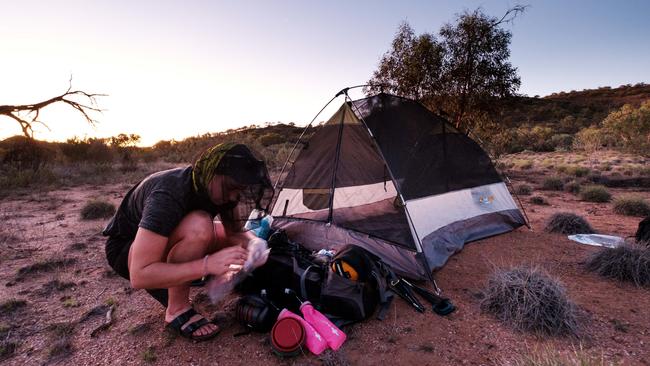
As borders began to close and Bell’s plan to race in an ultramarathon in Sri Lanka in March was cancelled, she hankered to fit in one more big wander through wilderness. The Larapinta Trail in the heart of Australia called.
“It was spectacular,” Bell says of the 10-day hike she did with friends – and a few thousand flies – through the gorges and ridges of the West MacDonnell Ranges. “It blew my mind; I really wasn’t expecting it to be so amazing.
“The gorges! They were breathtaking,” she says. “I’d never seen anything like that before. Just these massive red walls and massive swimming holes of freshwater. There’s nothing more amazing than doing a really hot hike, 40 degrees plus, then plunging into water.”
Another reason for the hike was to keep her sponsors happy; a range of product names are embedded in her epic Instagram photos. Bell “does all right” financially, she says. She organises the logistics of getting to and from her races but Flight Centre gives her a budget and she has contracts or brand ambassadorships with US-based headphone makers Jaybird, True Protein, Brooks Running, and Red Bull.
She’s still a personal trainer, getting shifts when she’s home at Body Fit Training in South Brisbane. She’s also a motivational speaker, with talks centred on overcoming adversity, finding purpose and mental health. The latter remains important for Bell, who has raised more than $23,000 for the Brisbane-based White Cloud Foundation, which helps people with, or at risk of, depression.
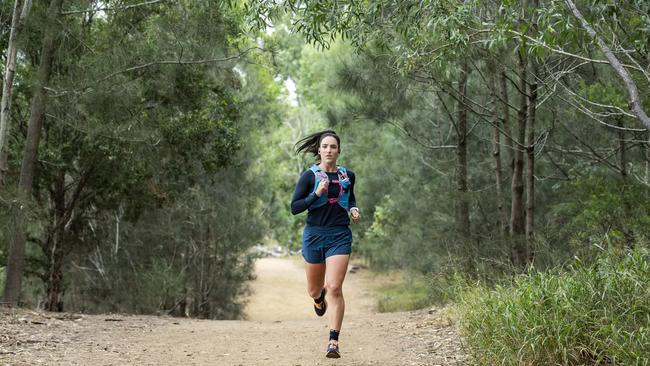
“They believe that for someone to be healthy, you need mental, physical, social and emotional health. And I agree, even if you’re the fittest, healthiest person, you need to be hanging out with friends and family.”
In the morning before we met, she was doing just that, hiking with her brother Harry, 26. She’s enjoying her down time; seeing friends, experimenting with vegan recipes, doing PT shifts at the gym … and training. She runs, cycles or goes to the gym up to four hours a day.
Because when the world opens up again, she wants to be out there, running. Having chalked up all the continents, she’s now keen to improve her times. “I’d love to win.” In the meantime, the Brisbane Trail Ultra 100 mile (160 km) through D’Aguilar National Park, just rescheduled from July to October, is on the horizon.
Forward planning is part of Bell’s life and she does envisage a time when there’s less flying around the world, strapping of feet and running across the landscape. Perhaps she’ll go into the gym business, put down roots and cut down to two races a year. But stop? She grins. “Women don’t hit their endurance peak until they’re about 35,” she says. “So, years to go.” ■


